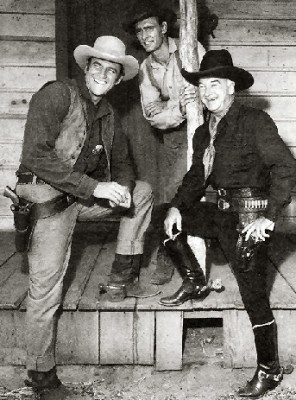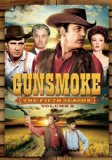| Reviews & Columns |
|
Reviews DVD TV on DVD Blu-ray 4K UHD International DVDs In Theaters Reviews by Studio Video Games Features Collector Series DVDs Easter Egg Database Interviews DVD Talk Radio Feature Articles Columns Anime Talk DVD Savant Horror DVDs The M.O.D. Squad Art House HD Talk Silent DVD
|
DVD Talk Forum |
|
|
| Resources |
|
DVD Price Search Customer Service #'s RCE Info Links |
|
Columns
|
|
|
Gunsmoke - The Fifth Season, Volume 2
As stated in earlier reviews, these taut, half-hour, black and white shows from the late 1950s and early '60s are generally much superior to the one-hour (and later still) full color ones. They offer compact, intriguing little scripts that play like short stories, the acting is usually excellent, and the direction and production values are comparable to movie Westerns of the period. As drama, the best Gunsmokes compare favorably to the best half-hour television dramas running concurrently, in any genre. If you're a fan of, say, the original Twilight Zone, you may be quite surprised by just how good Gunsmoke frequently is.
I've sung its praises many times already, having reviewed the first season, the the second season, volumes 1 and 2,and the third seasons, volumes 1, and 2, the fourth season, volumes 1, 2, and, of course, the fifth season, volume 1.
The fifth season of Gunsmoke was the first credited as an "Arness and Company" production. Star James Arness also gets a credit as Associate Producer, and it seems these were more than just titles and sources of additional income. During this season Arness, who maintained a reputation as an extremely generous man particularly in terms of looking after his casts and crews, may have been behind a general move to focus more episodes away from him and toward supporting players Amanda Blake, Dennis Weaver, and Milburn Stone. Their characters have much more to do and are enriched considerably in the process. Even bit players like Clem Fuller (as Long Branch Saloon bartender Clem) enjoy a choice scene here and there.
Never having watched Gunsmoke when it was in its last throes in the late-'60 and '70s, or in reruns, catching it all for the first time on DVD has been a minor revelation. I had no idea that these earlier, black & white, half-hour shows were so good. From the very first season they're way above average and, so far, continue only to improve. The bad news is after all these reviews it's darn near impossible coming up with something new to say.
This latest volume includes the final 19 episodes of the 1959-60 season, when as the Number 1 show in the Nielsen Ratings, Gunsmoke had a 40.3 rating and a 65 share, numbers unimaginable today. (For instance, the Number 1 show during 2005-06 was American Idol, which had a 17.7 rating and a 27 share.) The 19 episodes are spread over three single-sided, dual-layered DVDs, and as always look great. No extras.
The Gunsmoke that might have been: Matt Dillon meets Hopalong Cassidy.
As before, U.S. Marshal Matt Dillon (James Arness) and his eccentric, game-leg assistant (not deputy) Chester Goode (Dennis Weaver) are still maintaining the peace in unruly, barely-tamed Dodge City, Kansas. The various gunslingers and cattle rustlers causing Marshal Dillon no end of grief usually can be found drinking and gambling at one of the innumerable saloons. Matt's friend Miss Kitty (Amanda Blake), formerly a (coded) prostitute, is now half-owner of the city's finest, the Long Branch Saloon. She's also its madam, and though the audience doesn't get to see much of that business, it's implied. Matt's line of work often requires the services of cantankerous Doc Adams (Milburn Stone), another close friend of Matt, Chester, and Miss Kitty.
Writer John Meston (1914-1979) was to Gunsmoke what Rod Serling was to Twilight Zone; he penned an incredible 257 episodes of the series during its 20-year run, and that's not counting episodes of the radio show he also wrote (though there was a lot of crossover, apparently). Two of his favorite devices are the "What's Going On Here?" and "How's Matt Going to Solve/Get Out of This?" structures, with Matt presented with a puzzling situation/irresolvable conflict at the beginning of the episode, and he and other characters working through the mystery which is revealed/resolved, often violently, at the end. A favorite plot Meston did myriad riffs on has cool cucumber Matt withholding judgment on an accused killer's guilt or innocence while all of Dodge City is ready to lynch the accused. Sometimes in these shows the accused is a friend of Matt's, like Chester, sometimes he's a guest star, but always, even with a mountain of evidence stacked against him, Matt remains calm and just.
Many episodes fall into one of these categories. In "Hinka Do," a tough, no-nonsense Annie Oakley type, Mamie (Nina Varela, excellent) suddenly assumes ownership of a local saloon, while its milquetoast owner has vanished. Who is she? Did she murder the original owner and hide his body? Matt and Chester are on the case of this baffling, ultimately funny mystery.
Even better are episodes like "Doc Judge," an excellent showcase for Weaver, and which broadens the relationship between Doc and Chester. A psychotic stranger (Barry Atwater, impressively insane) comes gunning for Doc, the gunman mistakenly convinced Doc is the judge that sent him up years before. Doc refuses to take the man's threats seriously but Chester knows better, and with Matt out of town, he insists on protecting his cantankerous old friend.
"Kitty's Killing" is equally fine. She stands between a young family and an embittered, eccentric father (Abraham Sofaer) unable to contain a driving urge to murder his own son-in-law. This and "Doc Judge" feature (by television standards) unusually realistic killings, committed by series regulars other than Matt. Their traumatized reactions at having killed are also uncommonly authentic.
Indeed, Gunsmoke is impressively grim much of the time, especially when compared to safer, less ambitious and generally lighter shows of the color/one-hour years, or of many contemporaneous TV Westerns from 1959-60. "Jailbait Janet," for instance, begins with a brutal train robbery in which the baggage car man (Jon Lormer) is shot and later dies (again, realistically). Matt tracks the robbers down only to discover they're a homesteader and his two adult children, whose struggling farm was essentially destroyed by the uncaring railroad company, which simply ignored their claims. Nevertheless, Matt must bring the father (John Larch) to justice anyway, and it all ends tragically. "The Deserter" is similarly bleak, about a family destroyed by one wayward son's greed. By the end everyone is either dead, seriously injured (including Chester in a shocking flash of violence) or tainted from having killed somebody else.
Guest stars this half-season include semi-regular Dabbs Greer, Walter Burke, Raymond Hatton, Nan Peterson, Charles Aidman, Jack Elam, Hank Patterson, Ned Glass, Joanna Moore, Robert J. Wilke, a pre-Festus Ken Curtis, Allyn Joslyn, Ross Elliott, Fintan Meyler, Tom Reese, Douglas Kennedy, Nita Talbot, Morris Ankrum, Richard Chamberlain, Marilyn Maxwell, Lee Van Cleef, Peggy Stewart, Hal Smith, Henry Brandon, and Arthur Franz. Several actors appear in two episodes, playing different characters.
Directors giving Gunsmoke its movie-worthy appearance include Andrew V. McLaglen, Arthur Hiller, and Jesse Hibbs, mainly, but workhorse Jean Yarbrough helms one show. Writers John Meston and Les Crutchfield do the heavy lifting, but a number of these were adaptations of Marian Clark's original radio plays.
Video & Audio
Gunsmoke looks exceptionally good on DVD. Shows are a bit overly grainy (especially during the opening titles, reworked slightly for syndication) but otherwise they're very sharp, very clean. The 19 black-and-white episodes are spread over three discs, with a total running time of about eight hours and 16 minutes. The Dolby Digital mono (English only) is clean and clear, and the show is closed-captioned. The packaging allows viewers to read the episode descriptions inside the snap case without having to remove any of the discs.
Extra Features
Nothing.
Parting Thoughts
Another set of musts for Western fans, especially for those who recognize that the half-hour, black-and-white Gunsmokes actually hold up better than the more recent color ones. Taut and movie-like, Gunsmoke is classic American television and Highly Recommended.
Film historian Stuart Galbraith IV's latest book, Japanese Cinema, is on sale now.
|
| Popular Reviews |
| Sponsored Links |
|
|
| Sponsored Links |
|
|
| Release List | Reviews | Shop | Newsletter | Forum | DVD Giveaways | Blu-Ray | Advertise |
|
Copyright 2024 DVDTalk.com All Rights Reserved. Legal Info, Privacy Policy, Terms of Use,
Manage Preferences,
Your Privacy Choices | |||||||















